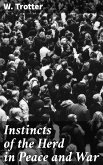In "Instincts of the Herd in Peace and War", Wilfred Trotter meticulously examines the innate behaviors and collective instincts that govern human interactions in both harmonious and tumultuous contexts. Written during the early 20th century, Trotter employs an engaging blend of psychological insight and anthropological analysis, drawing from various case studies and historical events to illustrate the profound impact of herd mentality on individual and societal actions. The work situates itself within the debates of social psychology and behavioral science, reflecting the era's burgeoning interest in understanding how instinctual drives shape human behaviors across different circumstances. Wilfred Trotter, a prominent English surgeon and an influential thinker of his time, was deeply interested in the intersection of psychology and social dynamics. His experiences through the First World War, witnessing the collective behaviors of soldiers and civilians alike, likely inspired his inquiry into the duality of human instincts. Trotter's academic background and his keen observational skills contributed to his ability to articulate the latent forces at play within groups, making his insights deeply resonant in an age grappling with the repercussions of collective violence and cohesion. This thought-provoking work is essential reading for anyone interested in the psychological undercurrents of social behavior, particularly in times of conflict. Trotter's insights remain remarkably relevant today, offering a profound understanding of how collective instincts shape contemporary society. Readers will find themselves compelled to reflect on their own roles within the herd and the implications of instinctual behavior in personal and global contexts.
Dieser Download kann aus rechtlichen Gründen nur mit Rechnungsadresse in A, B, BG, CY, CZ, D, DK, EW, FIN, F, GR, H, IRL, I, LT, L, LR, M, NL, PL, P, R, S, SLO, SK ausgeliefert werden.









